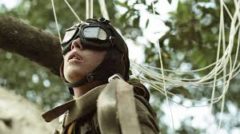A camera pans over an expanse of impenetrable jungle before zooming in on the boughs and leaves of a soaring tropical hardwood tree. Birds chirp and trill, and in the distance, an airplane trailing smoke and fire crashes into a body of water in a fiery explosion.
It is 1942 and the Japanese army is laying siege to the British colony of Singapore.

As the camera turns and weaves, it suddenly focuses on a young pilot entangled in the harness of a parachute caught in a tree. He is wearing a helmet and goggles, and his boots dangle a few feet from the ground.
Aaron Wilson’s Canopy, which was screened at the Toronto International Film Festival earlier in September, begins in dramatic fashion, and rarely lets up.
The leitmotif of Wilson’s Australian film is survival in a brutal environment. The pilot (Khan Chittenden) is certainly up to the challenge. He’s in a physically good shape, though a small twig has pierced his shoulder, and he has a first aid kit, a map and a compass to guide him through this murky wilderness on the edge of Singapore.
But he faces an assortment of dangers. The terrain is unforgiving. His boots continually sink into the slimy mud. He hears the voices of Japanese soldiers, who are presumably searching for him. He has no food.
As he stumbles through the dreary rainforest, he hears airplanes overhead, loud explosions, staccato machinegun bursts and, oddly enough, the sound of incongruously cheerful music emanating from a radio.
Occasionally, he presses himself into the ground as a Japanese patrol approaches, his face smudged with mud.
Wilson creates an atmosphere of uncertainty and potential menace before the film changes course in a few split seconds. With darkness enveloping him, the pilot runs into a man he mistakenly assumes to be an enemy soldier. In fact, the stranger (Mo Tzu-Yi) is a wounded Chinese resistance fighter.
Since the pair do not speak a common language, they communicate through gestures. Canopy, therefore, is virtually a wordless movie. Although they cannot converse, they form a bond that transcends ethnicity and culture. The pilot tends tohis companion’s stomach injury, and the Chinese fighter looks out for the pilot. Their symbiotic relationship is inspiring.
Wilson zeroes in on telling details to convey ambience. A closeup of perspiration droplets dripping down the pilot’s cheek speaks not only to humidity but to tension in the air. The sudden roar of an airplane reminds us that a war is being waged. The pilot’s hallucinations of home underscore his fear, desperation and longing for the familiar.
Canopy transports us into a heart of darkness, but leaves us with the faint hope that survival is possible despite the imposing odds.